If you are creating 500-word me-too blog posts that get read by no one, you are completely and absolutely wasting your time.
It's not your fault. You've been told by so-called experts for years that if you blog consistently, you will see truckloads of traffic, thousands of subscribers, and millions of dollars in sales.
The thing is, a lot of these experts cut their teeth in the early years of the Web, when 500-word blog posts could win you fame and fortune.
Now? Not so much.
If you're serious about standing out from the 2 million blog posts pumped out every day, here's what you need to start doing.
(Editor's note: For an in-depth look at the topic of this article, see Ann Handley's Wall Street Journal best-seller, Everybody Writes: Your Go-To Guide to Creating Ridiculously Good Content.)
1. Start writing better titles
A part of me dies every time I see an "SEO-optimized" title seemingly meant to destroy all joy from the act of writing (or reading). I'm talking about titles like these:
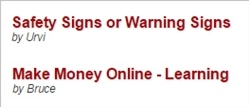
In general, any title that looks like it was vomited out by a keyword tool might please Google, but it definitely won't drive users to click on your link.
Google is an algorithm. Your users (and eventual customers) are human. It's high time you start writing for the humans.
The stats don't lie: 80% of readers will read the headline, but only 20% will read the rest. A strong title can lead to 500% more pageviews.

Upworthy didn't become the fastest-growing media company in the world without obsessively testing titles.
So how do you create "human-optimized" titles?
That's a big question, and people more qualified than I am have written about it, but for the most part you...
- Incite curiosity, but don't fulfill it (the "curiosity gap" or the "you won't believe what happened" headline).
- Exaggeration and hyperbole (the "this is the most epic thing ever" headline).
- Shock, incite, outrage (the HuffingtonPost school of headline writing).
- Be unusual (like the headline of this article you're now reading).
- Be incredibly useful (e.g., by creating the definitive guide to SEO ranking factors)
For a crash course, check out Jon Morrow's e-book, Headline Hacks.
2. Have a voice (or at least write in the first person)
Want to experience crippling sadness and depression? Go ahead and start browsing through some corporate blogs.
You'll see page after page of droll corporate-speak offering no real value or opinion, punctuated by the saddest sight in all of blogging: "0 Comments."
The worst of the lot will stick to third-person, seemingly distancing the author from all expressed opinions and making the blog that much duller.
Writing in a unique voice is not particularly difficult; you write the way you speak. It requires confidence more than it requires skill. With enough of the former and a bit of the latter, anyone can write in a unique voice.
How do you build up this confidence? Just follow these three simple rules:
- Read good writing, and read a lot.
- Write every day.
- Share your writing with the world.
Yup, it really is that easy.
3. Write longer pieces
I know, long pieces are hard. You have to spend hours researching the topic, organizing the content, and writing the post. You'd much rather fire up Word, pump out a 500-word post, and call it a day.
Except, those 500-word posts will only work if your first name is Seth and your last name is Godin.
If you feel tempted to write short blog posts, here are a few arguments to the contrary.
A. Longer blog posts rank better in the SERPS
The average number of words for the top 10 results in Google was more than 2,000, According to a study by SERPIQ:
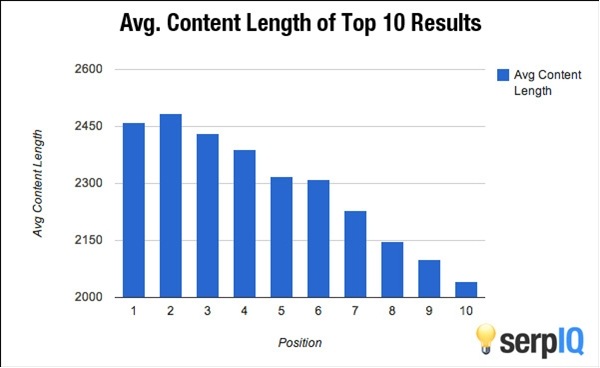
Simply put, Google equates longer content with higher value. Which means better rankings and more traffic.
B. Longer posts get more shares
Buzzsumo did the math and found that the longer the post, the more shares it gets:
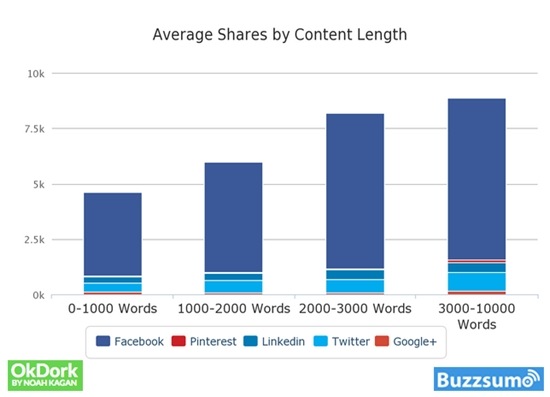
A 3,000-10,000-word post effectively gets 2.5 times the shares of a 500-1,000-word post.
A caveat before you hunker down and write that 10,000-word epic post: analyze the benefits of the additional shares vs. the cost of producing a 10,000-word behemoth.
For most businesses, the benefits do not justify the cost. Stick to 1,500-3,000 words; you'll balance effort with traffic, and you'll be golden.
C. Longer posts convert better
CrazyEgg increased conversion rates 363% by switching to a long-form page.
Meanwhile, in a study conducted by Marketing Experiments, long-form pages converted 40.54% more than short-form pages.
D. Long posts get more backlinks
Here's a chart of the number of posts on the Moz.com blog by word count:
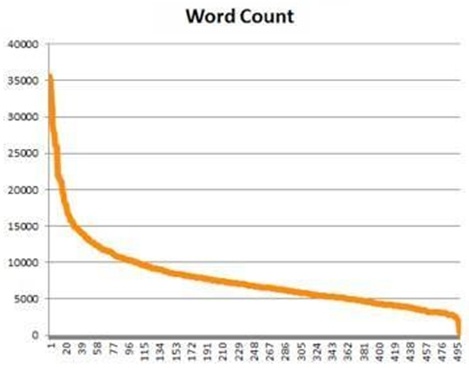
And here's a chart of the number of backlinks to those posts:
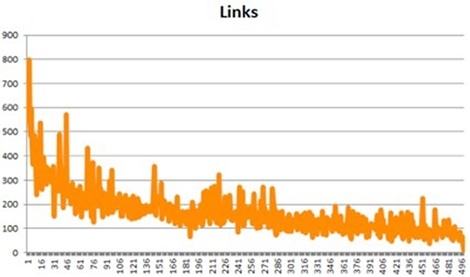
Short answer: longer content performs better in every aspect.
4. Make it pretty
The future will belong to publishers who can present content beautifully.
No, you don't have to spend $100,000 and rebuild NYT's Snowfall story, but a few graphs, pictures, and readability hacks will go a long way toward getting people to stick around.
Articles with pictures get shared more than twice as much as those without.
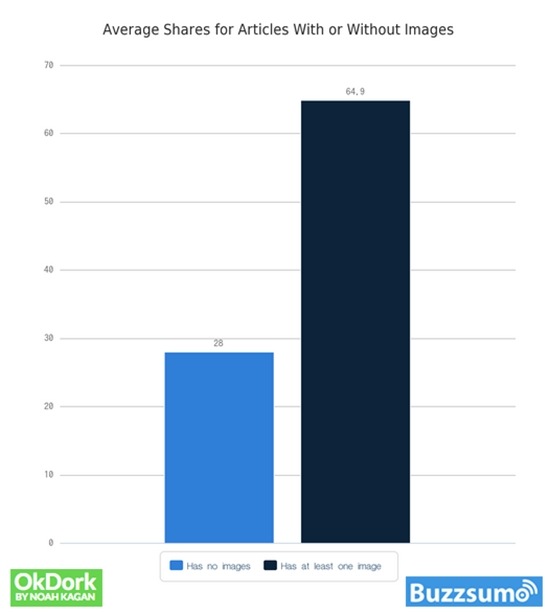
Your readers will also naturally pause at images in an article (which is why BuzzFeed has all those picture-riddled lists).
Here's a few things you can do to make your content prettier:
A. Use gorgeous header images
You can get breathtaking stock images for as low as $1. Alternatively, you can use a free tool, such as Canva, to create simple and useful header imagery.
B. Create short infographics for key information in a post
Short images that pack key concepts from the post into an easy-to-share, easy-to-consume format are a wonderful way to break up posts into sections and give readers something to linger over.

Like this!
Spread them throughout the post in long articles, and you will improve readability and cut down on bounce rates.
C. Improve readability
Nothing scares off readers faster than big chunks of text. It's not their fault; it's a fault of the format. Readers want to read dense pieces of prose, but only when it's in the form of a substantial long-form article or book.
For your typical business blog, that doesn't really apply.
To make your post more readable, try to...
- Break up key concepts into bullet points.
- Use short, 2-3 sentence paragraphs.
- Keep sentences as short as possible. Feel free to break this rule if it interferes with your ability to write better.
- Use images to break up content into sections.
D. Use Animated GIFs
Nope, never use GIFs. GIFs are evil and should remain on BuzzFeed.
5. Stick to a plan
You do have a content plan, right?
I'm still amazed at the number of startups, other businesses, and "serious" bloggers that start blogging without a plan or strategy. They spend months writing whatever they feel like, then wonder why they get no shares, traffic, or comments.
You wouldn't start a road trip without a map... so before you put down a single word on (metaphorical) paper, chart out a detailed content strategy for your blog.
(HubSpot has a handful of resources.)
6. Promote like crazy
Jon Morrow of BoostBlogTraffic says to be successful as a blogger you must spend as much time promoting as you do creating your content.
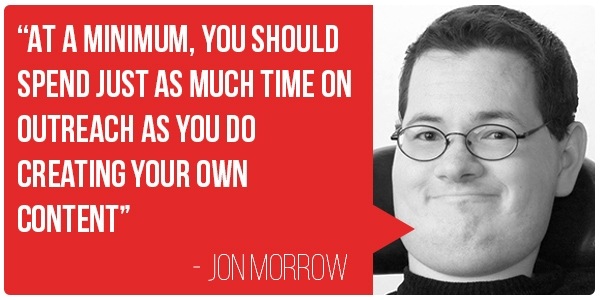
When Jon speaks about blogging, I tend to listen to what he has to say.
It doesn't matter whether you are blogging for a budding startup or penning down thoughts as you backpack across the globe, at least half of all your blogging time and budget should be devoted to promotion.
Here are some strategies to help you kick-start your blog promotion:
- Influencer outreach: Build relationships with influencers; use their platforms to promote your content via guest posts, article reprints, etc.
- Paid promotion: Throw a few dollars into Facebook ads every time you publish to drive the initial rush of shares. If you have strong visual content, try Pinterest promoted pins. For higher-value, B2B focused content (whitepapers, e-books, etc.) Google AdWords can work as well.
- Link-building: Use old-school link-building techniques. such as outreach, broken-links, and the excellent "skyscraper technique" by Brian Dean of Backlinko.
7. Gather data
Quick questions: What was your best performing blog post last year? What was its keyword/topic? How did it receive the bulk of its traffic—organic, social, or direct?
If you don't have ready answers, you probably aren't tracking data obsessively enough.
Gathering data and using it to improve the blog is often the number one differentiator between successful and not-so successful blogs. The best blogs (and their creators) know what works and they pump out more of it.
Take some time to learn Google Analytics. A one-day investment in mastering GA will give you a world of previously unavailable insight into your business. Liz Lockard's introductory course is a good starting point. Jump into Avinash Kaushik's posts on advanced analytics when you're familiar with the basics.
A day or so invested in understanding data will go a long way toward improving your content performance.
* * *
There is a war for attention, and you have only a few seconds to make an impact. You can't afford to be dull, stale, or boring. To turn visitors into readers, readers into leads, and leads into customers, you need content that stands out.














